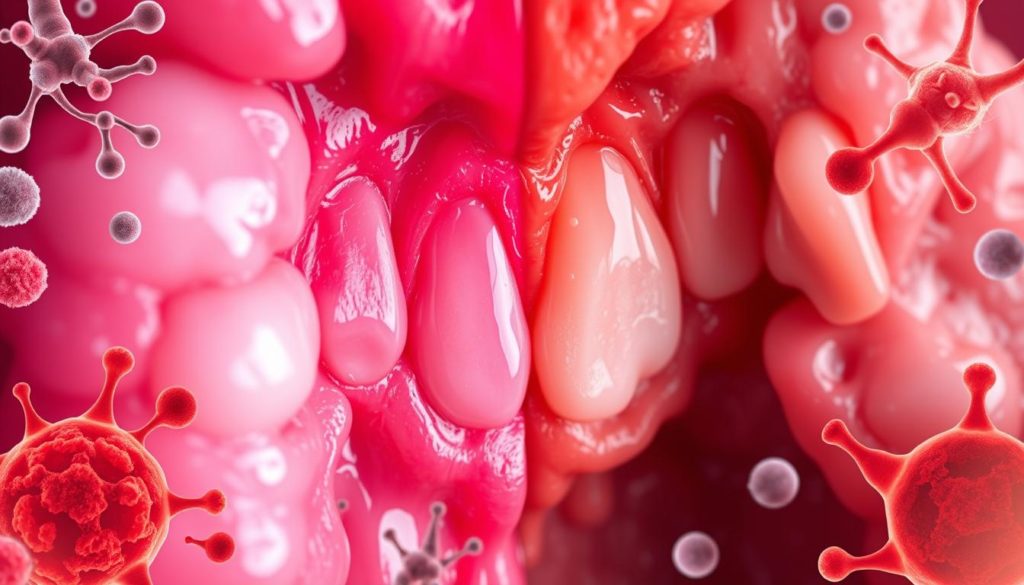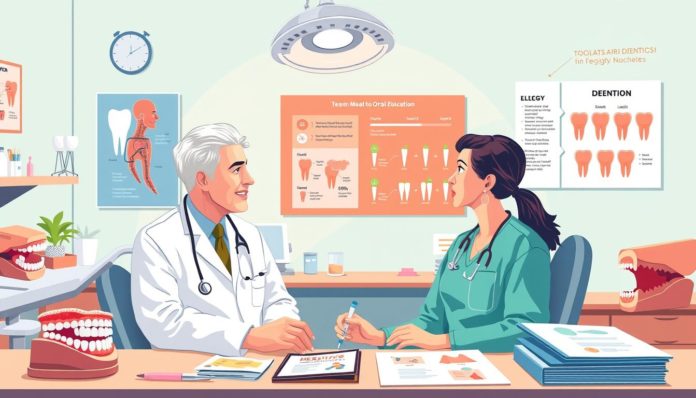Dentists and doctors need to work closer together for better care. Oral health is key for doctors to understand fully. MD Periodontics focuses on sharing dental knowledge with medical pros, while keeping patient details private and content true.
Teaching doctors about oral health is getting more important. We offer materials to help doctors and patients connect well. This includes spotting dental problems early and seeing how overall health affects the mouth. Dive into this guide to learn what dentists hope doctors knew for better patient care.
The Connection Between Oral Health and Systemic Health
Knowing how oral health and overall health are linked can greatly improve how we care for patients. It looks into how gum disease is related to diabetes and heart health.

Periodontal Disease and Diabetes
Diabetes and gum disease affect each other. Diabetes makes people more likely to get infections like gum disease.
On the flip side, serious gum disease can raise blood sugar levels. This makes diabetes harder to manage. Visiting the dentist regularly helps keep blood sugar in check and boosts health.
Cardiovascular Health and Gum Disease
There’s a lot of study on how gum disease and heart health are connected. Gum disease can cause inflammation, a big risk for heart conditions.
Going to the dentist often is key to spotting and treating gum disease early. This could lower the chance of heart disease and strokes. Health workers should urge good dental care to promote overall health.
Effective Communication Between Dentists and Doctors
Good communication between dentists and doctors is key for top-notch patient care. It makes sure both groups coordinate well, ensuring better health results. This teamwork is vital.
Referral Best Practices
To make sure patients get the care they need, dentists and doctors must follow referral guidelines. A dentist should send a detailed note when they see a problem needing a doctor’s eye. This note must have patient info, their health history, and what the doctor should look into.
In return, when a doctor sends someone to a dentist, they should also share vital health details and specific issues that need care. This way, the transition is smooth, and patients don’t run into snags or confusion.

Interdisciplinary Healthcare Collaboration
Dentists and doctors teaming up marks a big step forward in patient care. Especially for ongoing illnesses that affect both dental and general health, like diabetes or heart disease. Working together, they can significantly boost patient health.
This partnership involves meeting regularly and talking about shared patients. They use digital records to keep info current. A clear plan for chatting ensures no detail is missed, making care more effective.
| Aspect | Dentists | Doctors |
|---|---|---|
| Communication | Provide detailed dental findings | Share comprehensive medical history |
| Referrals | Send clear referral notes | Relay specific medical concerns |
| Collaboration | Regularly update on patient progress | Participate in interdisciplinary meetings |
Recognizing Early Signs of Dental Problems in Medical Patients
Spotting dental issues early improves patient health. Look for signs like gingival recession and dental erosion. These problems can get worse if not noticed early.
Identifying Gingival Recession
Gingival recession means losing gum tissue, exposing tooth roots. Healthcare providers should look for signs like tooth sensitivity, teeth that look longer, and visible roots. Catching gingival recession early helps avoid serious issues and leads to timely dental referrals.
Spotting Dental Erosion
Dental erosion involves losing enamel due to acid. Signs include greater tooth sensitivity, changes in color, and teeth looking rounded. Early detection of dental erosion prevents major damage, allowing quicker treatment.
Here’s a table to help spot these early signs:
| Early Signs of Dental Problems | Identification Tips |
|---|---|
| Gingival Recession | Look for tooth sensitivity, exposed tooth roots, and longer-looking teeth. |
| Dental Erosion | Watch for increased sensitivity, tooth discoloration, and rounded teeth. |
The Importance of Patient Education on Oral Hygiene
Teaching patients about oral hygiene is key to keeping healthy overall. Both dentists and doctors play a big part in this. They help patients understand how taking care of their mouth leads to better health.
When doctors learn about oral health, their patients get better care. They teach patients to brush and floss regularly to stop oral diseases. Doctors with knowledge in dental care tips for doctors give extra help, supporting dentists’ work.
Having doctors and dentists work together helps patients learn about oral health better. MD Periodontics shows how important this teamwork is. They run workshops and seminars to teach doctors about keeping mouths healthy.
Teaching simple things like the right way to brush and floss is very important. Doctors can share these easy-to-follow tips during visits. This doesn’t just keep mouths healthy. It also lowers the risk of other health problems caused by bad oral hygiene.
Getting patients to keep up good oral hygiene habits can greatly lower dental problems. MD Periodontics and other dental experts make sure patients have the information they need. This helps patients take care of their oral health on their own.
Dental Terminology for Medical Practitioners
Knowing important dental terminology for medical practitioners improves patient care. Doctors should know key dental terms. This helps them understand treatment plans and talk with dentists.
Common Dental Terms Physicians Should Know
It’s vital for doctors to understand dental terms. Below are important dental terms every medical practitioner should learn:
- Gingivitis: The swelling of the gums, often the first sign of more severe gum diseases.
- Periodontitis: A grave gum infection that harms the soft tissue and bone supporting teeth.
- Occlusion: How teeth in the upper and lower jaws meet when the mouth closes.
- Caries: Tooth decay caused by cavities that ruin the tooth’s enamel and dentin.
- Endodontics: The dental field focusing on the dental pulp and its issues.
Using these terms in medical checks helps spot health problems early. For more on oral health’s effect on overall health, see this article.
Proper Flossing Techniques to Share with Patients
Teaching right flossing methods helps enhance oral health. Dentists suggest the ‘C’ shape flossing for deep cleaning. Learn it here:
- Use about 18 inches of dental floss, winding it around your middle fingers, leaving an inch or two to floss with.
- Keep the floss tight between your thumbs and index fingers.
- Slide the floss gently between your teeth in a back-and-forth motion.
- Form a ‘C’ shape with the floss against one tooth and slide it between the gum and tooth until you hit resistance.
- Press the floss on the tooth side and scrape gently, moving away from the gum.
- Do this for all teeth.
Doctors sharing knowledge on flossing can help promote good oral health practices. This also aids in spotting early signs of dental issues.
Things Dentists Wish Doctors Knew
The link between dental health and overall health is crucial but often ignored. We will explore important insights from dentists to improve care.
The Critical Role of Baby Teeth
Baby teeth are more important than some think, playing a key role in a child’s growth. They help adult teeth grow in right by keeping space. They also help kids talk clearly and chew well.
Doctors should tell parents to take care of their kids’ teeth early on. This helps ensure their long-term dental health.
Myths About Dentures
There’s a lot of wrong info about dentures that needs clearing up. They’re not a simple, one-time solution. They must be adjusted regularly to fit right.
People with dentures may have to change how they eat and might struggle with speaking at first. Doctors should give patients the real story on living with dentures.
Addressing the Oral Health Needs of Diabetic Patients
The oral health needs of diabetic patients are unique and require special knowledge. Understanding the link between periodontal disease and diabetes is crucial.
Diabetic patients often deal with oral health issues due to changing blood sugar levels. It takes a team effort from both dentists and doctors to manage these issues well.
- Monitoring blood glucose levels regularly.
- Maintaining a thorough oral hygiene routine.
- Visiting the dentist at least bi-annually.
- Understanding the link between high sugar levels and gum disease.
Here’s a detailed comparison of diabetic versus non-diabetic oral health needs:
| Key Aspects | Diabetic Patients | Non-Diabetic Patients |
|---|---|---|
| Periodontal Disease Risk | Higher | Lower |
| Healing Rate | Slower | Normal |
| Frequency of Dental Visits | More Frequent | Regular |
| Oral Hygiene Requirements | More Intensive | Standard |
Early recognition of oral health needs of diabetic patients can improve their health in the long run. Integrated care and clear communication between all healthcare providers are key.
The Impact of Medications on Oral Health
Many medications prescribed by doctors can impact oral health in ways you might not expect. It’s vital to understand how these medicines affect your mouth’s health. By working together, doctors and dentists can help keep your smile healthy even when you need medication.
Common Medications That Affect Oral Health
Some medicines can harm your oral health, leading to issues like dry mouth, gum growth, or more infections. Medicines such as antihistamines, antidepressants, and some high blood pressure drugs are known for this. They can lower saliva production, important for a clean mouth and fighting bacteria. Dentists and doctors should work together to minimize these side effects.
Managing Medication Side Effects
Doctors and dentists must work closely to manage medication side effects on oral health. They should advise patients to keep their mouth clean and drink plenty of water. This helps against the drying effects of some drugs. Solutions like saliva substitutes and fluoride treatments are also helpful.
When prescribing new drugs, doctors need to think about the possible oral health impacts. Doctors should share these concerns with the patient’s dentist. This team effort helps keep the patient’s health in top condition, from head to toe.
Nutritional Advice for Promoting Dental Health
Good dental health needs more than just brushing and flossing. Eating right is key too. Dentists and doctors should know what foods boost oral health. They can tell patients how to prevent tooth decay and strengthen their teeth and gums.
Dietary Recommendations for Avoiding Tooth Decay
Stopping tooth decay means eating less sugar and acidic foods. These can weaken enamel and help bacteria grow. Instead, choose fruits and vegetables high in fiber. They make more saliva, which cleans your teeth. Eating dairy like cheese and yogurt can also protect against cavities by balancing mouth acids.
Foods That Strengthen Teeth and Gums
For strong teeth and gums, focus on calcium and phosphorus. Milk, cheese, almonds, and green veggies have lots of calcium. This keeps teeth strong. Phosphorus is in eggs, fish, and lean meats. It helps rebuild enamel. Foods high in vitamin C like oranges support healthy gums too.
A balanced diet is vital for dental health. With the right food, you can avoid decay and make your teeth stronger. This leads to healthier smiles and better oral health over time.
FAQ
How are periodontal disease and diabetes related?
Gum health problems can make blood sugar hard to control. On the other hand, diabetes raises the chance of getting gum disease. Knowing this helps manage both conditions.
Can oral health impact cardiovascular health?
Yes, there’s evidence that gum disease might up the risk for heart issues. Gum inflammation can make heart disease more likely. So, taking care of your mouth is key for your heart too.
What are some best practices for dental referrals?
Good dental referrals should share patient history, the reason for referral, and any health issues. Clear communication between doctors and dentists makes care better.
Why is interdisciplinary healthcare collaboration important?
Working together across different health fields improves patient results. By combining their expertise, dentists and doctors can address oral and overall health together.
How can physicians identify early signs of gingival recession?
Doctors should watch for tooth roots showing, sensitivity, and gum changes. Spotting these early can stop worse problems with mouth health.
What are the indicators of dental erosion that doctors should watch for?
Look out for smooth, shiny teeth and more sensitivity. Catching these signs early helps with getting the right dental help fast.
Why is patient education on oral hygiene important?
Teaching patients how to brush and floss right can stop many mouth problems. It’s a way to keep health good over the long run.
What common dental terms should physicians be familiar with?
Doctors should know terms like ‘gingivitis,’ ‘periodontitis,’ ‘dental caries,’ and ‘endodontic treatment.’ It helps them work well with dentists on patient care.
What’s the correct technique for flossing that doctors can share with patients?
Telling patients to floss in a ‘C’ shape around each tooth really helps. This advice can make a big difference in their oral care routine.
What role do baby teeth play in a child’s development?
Baby teeth matter for eating, talking, and saving space for grown-up teeth. They affect a child’s growth and future mouth health.
Are dentures a simple solution for missing teeth?
Dentures aren’t just an easy fix. They need fitting and can change day-to-day life. It’s important to set the right expectations about them.
What unique oral health needs do diabetic patients have?
People with diabetes get gum disease and dry mouth more often. Doctors need to know this and help with dental care.
How do medications affect oral health?
Some meds can cause dry mouth, swollen gums, and more cavities. Doctors should watch for these risks and work with dentists to lessen them.
What are common medications that impact oral health?
Drugs like antihistamines, blood pressure pills, and antidepressants can harm mouth health. Knowing these can help in preventing dental issues.
How can doctors help manage medication side effects on oral health?
Doctors can suggest regular dental visits and dry mouth solutions like sugar-free gum. This helps with common issues from meds.
What dietary recommendations help avoid tooth decay?
Eating less sugar and acid helps prevent tooth decay. Suggesting more fruits, veggies, and dairy is good for dental health.
Which foods are beneficial for strengthening teeth and gums?
Foods with calcium and phosphorus, like cheese, nuts, and greens, strengthen teeth and gums. They keep the mouth healthy.


